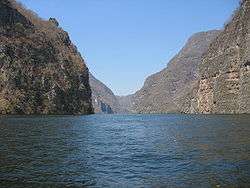Grijalva River
| Grijalva River | |
|---|---|
|
The cliffs at Sumidero Canyon, overlook the Grijalva River. | |
| Native name | Río Grijalva |
| Country | Mexico |
| Basin features | |
| River mouth |
Gulf of Mexico 0 m (0 ft) 18°36′10″N 92°41′33″W / 18.60278°N 92.69250°WCoordinates: 18°36′10″N 92°41′33″W / 18.60278°N 92.69250°W |
| Physical characteristics | |
| Length | 480 km (300 mi) |
Grijalva River, formerly known as Tabasco River. (Spanish: Río Grijalva, known locally also as Río Chiapa and Mezcalapa River) is a 480 km long river in southeastern Mexico.[1] It is named after Juan de Grijalva who visited the area in 1518.[2] The river rises in Chiapas highlands and flows from Chiapas to the state of Tabasco through the Sumidero Canyon into the Bay of Campeche. The river's drainage basin is 134,400 km² in size.[3]

After flowing from Nezahualcoyotl Lake, an artificial lake created by the hydroelectric Malpaso Dam, Grijalva River turns northward and eastward, roughly paralleling the Chiapas-Tabasco state border. It flows through Villahermosa (where, in 2001, a new cable-stayed bridge was constructed to cross the river) and empties into the Gulf of Mexico, approximately 10 km northwest of Frontera. The river is navigable by shallow-draft boats for approximately 100 km upstream.
See also
References
- ↑ "Grijalva." Merriam-Webster's Geographical Dictionary, 3rd ed. 2001. (ISBN 0-87779-546-0) Springfield, MA: Merriam-Webster Inc., p. 450.
- ↑ Diaz del Castillo, Bernal. The Discovery and Conquest of Mexico. Da Capo Press, 1996. p. 21
- ↑ World Delta Database
| Wikimedia Commons has media related to Grijalva River. |
